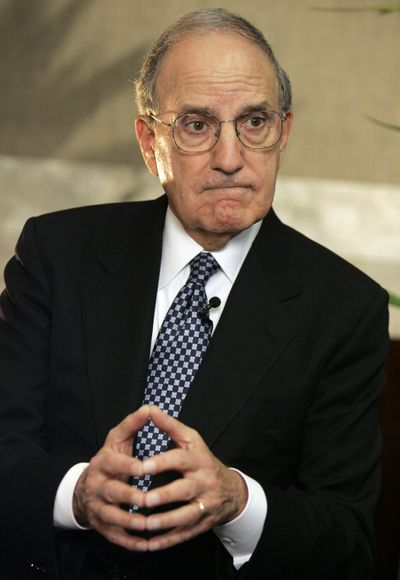Obama pins hopes for peace in Middle East on Mitchell
Former senator brokered accord in Northern Ireland

WASHINGTON – During a grinding 18-month stretch in the 1990s, U.S. envoy George J. Mitchell crossed the Atlantic more than 100 times in a dogged search for peace between Northern Ireland’s Protestants and Catholics.
Even though he is a Catholic, Mitchell persuaded Protestant Unionists of his even-handedness, eventually reaching the “Good Friday” agreement in 1998 to help settle the 800-year dispute.
“He’s got this incredible patience to sit there until the deal is done,” said Ross K. Baker, a political scientist and former congressional aide. Mitchell, he said, “deserves the iron trousers award.”
President Barack Obama hopes that the former Senate majority leader, as his new Middle East peace envoy, is prepared to sit a while longer in an effort to settle the conflict between Israelis and Arabs. The 75-year-old Mitchell is widely considered up for the challenge.
“He understood the wheeling and dealing on the floor of the Senate, and he understood the one lesson that to get people to support something, everybody had to get something out of it,” said Reg Empey, a Unionist who was involved in the negotiations and is now a minister in the Belfast government.
Since leaving the Senate in 1995, Mitchell has taken on one seemingly intractable problem after another.
He led an inquiry into steroids use in baseball, mediated a corporate civil war as chairman of Disney Co., investigated allegations of corruption at the Olympics, and twice has tried to settle the Middle East dispute.
The latest job “seems impossible to everybody else,” said a former Democratic Senate staffer who worked with him. “To him, it’s another assignment.”
Obama and Secretary of State Hillary Rodham Clinton chose Mitchell to convey the administration’s determination about Middle East peacemaking.
Mitchell won a reputation for even-handedness in his first foray into Middle East peacemaking, in 2000 and 2001, when he led a six-month fact-finding effort probing the reasons for a convulsion of Palestinian violence.
The Mitchell report gave each side something to like and dislike. The panel urged Israelis to halt all settlement activity and to stop shooting at unarmed demonstrators, while calling on Palestinian authorities to stop violence and punish those who commit it.
“Neither side was entirely happy, and that was a good thing,” said Ghaith al-Omari, who was then a Palestinian negotiator and is now with the American Task Force on Palestine, a Washington group favoring statehood.
The diplomat’s neutral approach may encounter more skepticism following the breakdown of a cease-fire, rocket attacks on southern Israel from Hamas fighters in the Gaza Strip and a three-week Israeli offensive.
A number of a pro-Israel and pro-Palestinian groups, as well as the Israeli government, have praised the selection of Mitchell, who is part Lebanese. But some on the pro-Israel side also have expressed misgivings about Mitchell. They also fear the Obama administration could increase pressure on Israel to make concessions.
Although his mother was Lebanese, Mitchell has not been active in advocacy groups espousing Arab causes. As a senator, his voting record was considered solidly pro-Israel.
The Mitchell report, which was ordered up by the Clinton administration in October 2000, was delivered in 2001 to the new Bush administration.
Both the United States and Israel endorsed it. But because violence was continuing, al-Omari said, it was “close to stillborn.”
Nevertheless, some of its key ideas, such as its plans for step-by-step, reciprocal moves toward negotiations, were incorporated into later U.S. plans for peace.
Al-Omari said Mitchell’s approach was to consult widely, to convince participants of his sympathy with their goals, but also not to yield to pressure once he had reached conclusions.
In his work on Northern Ireland, Mitchell once coaxed the two sides to meet in London as a way of getting them out of their usual environment to see each other “as human – as people with grandchildren, with hobbies,” said Paul Dixon, an expert on the conflict who teaches at Kingston University in London. At one dinner, they were forbidden to talk about politics, and instead chatted about topics like fly fishing and opera.